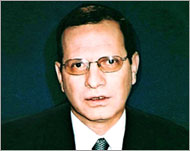US launches new offensive in Iraq
US Marines have launched a another major operation, the third in as many weeks, against anti-US fighters in Iraq’s Euphrates valley.

Operation Scimitar involved about 500 US and 100 Iraqi troops, making it about half the scale of Operation Sword and Operation Spear in the past three weeks.
The military said that the marines had detained 22 suspected fighters since the raid was launched in the village of Zaidon, 30km southeast of Falluja on Thursday.
Washington says the western Euphrates valley between the Syrian border and Baghdad is a conduit for foreign fighters behind a wave of bombings that worsened after the Shia and Kurdish-led government took power in April.
Marines in western Iraq have launched operations just about weekly, hoping to clear fighters out of town after town.
During Operation Spear, they called in air strikes and left much of the border town of Karabila in ruins after battles they said killed dozens of fighters. Operation Sword was quieter, with no heavy resistance reported.
Egypt envoy’s killing
This month has seen a relative lull in car bombings – down to around one a day in Baghdad from twice that last month.
But US commanders say the total number of attacks is fairly stable, at 50-60 a day, and that there has been a shift toward other forms of violence, including attacks on diplomats.
 |
|
Ihab el-Sherif was abducted in |
Offering condolences to Egyptian President Hosni Mubarak on the killing of Cairo’s envoy to Baghdad, who was abducted a week ago by al-Qaeda fighters, Iraqi President Jalal Talabani proposed a regional conference on fighting the violence.
The Baghdad government and its sponsors in Washington have been trying to stem an exodus of diplomats after other attacks on the Pakistani and Bahraini envoys.
The violence appears aimed at thwarting the government’s efforts to win greater recognition from cautious Muslim and Arab states.
Referring to the killing of Egypt’s Ihab el-Sherif, Iraqi Foreign Minister Hoshiyar Zebari said: “This cowardly act is an attempt to terrorise a brotherly Arab Muslim country.”
Diplomatic ties
Egypt said it was cutting staff at its embassy. Meanwhile, Iraqi comments on the ambassador drew a firm response from Cairo.
Egypt has asked the Iraqi embassy in Cairo to explain an Iraqi suggestion that Sherif was in touch with Iraqi fighters, the Egyptian Foreign Ministry said on Saturday.
 |
|
King Abdullah of Jordan says he |
A ministry statement did not deny that such contacts did take place, but asked whether the purpose of Iraqi remarks was to “avoid responsibility … and justify a tragedy”.
Pakistan withdrew its ambassador after his motorcade was fired on, and Bahrain’s envoy was wounded by gunmen.
Other Arab countries, mostly ruled by Sunnis, have yet to give their diplomats in Baghdad full ambassador status, although Iraq says Jordan and Syria will soon do so and Egypt had planned to do before Sherif was killed.
Baghdad and Washington have called on Arab states not to let the attacks stop them from upgrading ties.
Autonomy
Speaking to CNN, King Abdullah of Jordan said his country would not let anti-US fighters influence Jordanian policy and would soon send an ambassador to Baghdad.
“Sooner, rather than later. We are not going to allow these limited extremists … to have any effect. We’re in close coordination with the Iraqi government,” he said.
 |
|
Oil rich Basra in southern Iraq is |
As it tries to limit the impact of the killing of the Egyptian envoy and other violence, the Iraqi government could come under fresh political pressure from new calls for autonomy.
Secular Shia politicians called for autonomy in oil-rich southern Iraq similar to that enjoyed by Kurds in the north, a move that could deepen tensions over federalism amid raging violence.
Baqer al-Tamimi, a leading player in the southern autonomy drive, said demands included the creation of a regional parliament and government.
The demands came during a conference in the southern city of Basra, attended by more than 1000 people.